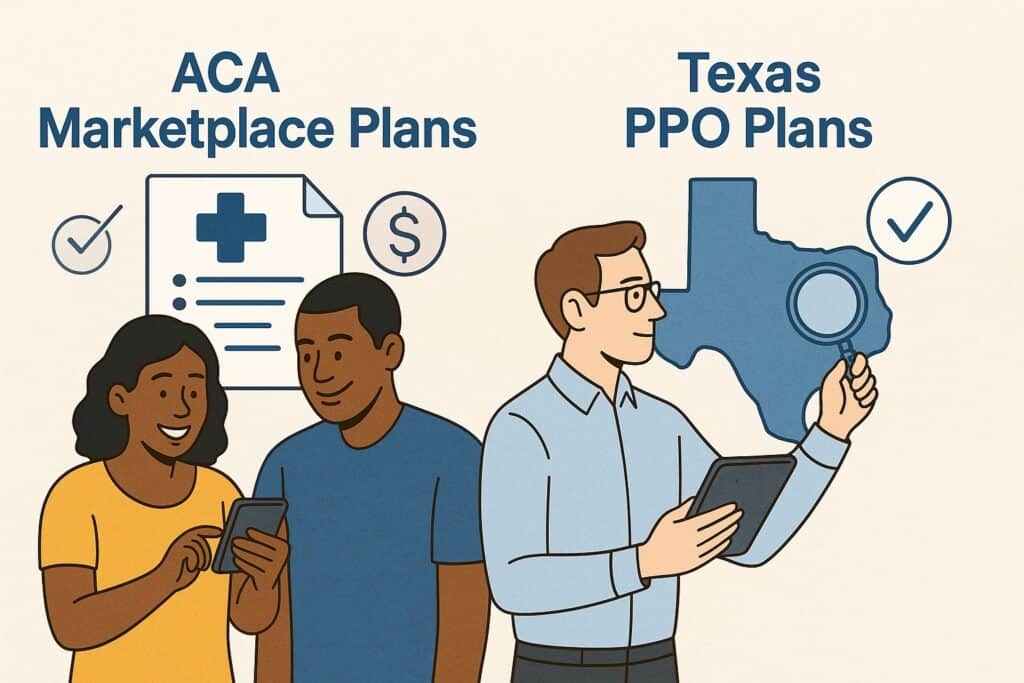Health Insurance in Texas: Plans, Costs & Coverage Options
Texas has more uninsured residents than any other state, over 5 million people, or nearly 1 in 5 Texans. But in 2025, there are more affordable and flexible coverage options than ever. Whether you’re a freelancer in Austin, a part-time worker in Houston, a retiree in San Antonio, or a student in Dallas, you can find a plan that fits your lifestyle and budget.
From ACA marketplace plans with subsidies to private PPOs with wider provider access, we help you compare the best health insurance options available statewide.

What Health Insurance Options Are Available in Texas?
Texans can access several different types of health insurance, each with its advantages depending on income, age, health needs, and geographic location. Understanding your options is the first step toward choosing the right plan for you or your family.
1. ACA Marketplace Plans (Obamacare)
These plans are available through Healthcare.gov and cover essential health benefits such as emergency care, hospitalization, prescription drugs, mental health services, and maternity care. Plans are divided into metal tiers: Bronze, Silver, Gold, and Platinum. The vast majority of enrollees in Texas (over 90%) receive financial assistance to lower their premiums or out-of-pocket costs.
ACA plans are best suited for individuals who qualify for subsidies based on income, need robust coverage, or want protection against high medical costs. Enrollment is limited to Open Enrollment or certain life events that trigger Special Enrollment Periods.
2. Private PPO Plans
Preferred Provider Organization (PPO) plans are popular in Texas for their flexibility. Unlike HMO plans, PPOs allow members to see both in-network and out-of-network providers without referrals. This makes them ideal for people who want more control over their care, regularly see specialists, or travel frequently.
While many PPO plans are not available on Healthcare.gov, they can often be purchased directly through private insurers or licensed brokers. These plans tend to be more expensive but provide broader access to hospitals and specialists, including top facilities in and out of state.
3. Short-Term Health Insurance
Short-term plans are a legal and flexible option in Texas. They can provide coverage for a few months to up to a year (with renewals up to 36 months), helping bridge gaps in coverage between jobs or during transitions. These plans typically cost less than ACA or PPO plans but come with limitations, including exclusions for pre-existing conditions and restricted coverage for prescriptions, maternity, or mental health.
Short-term plans are not recommended for individuals with chronic health needs, but may be appropriate for healthy individuals looking for low-cost temporary coverage.
Each option has trade-offs in terms of cost, coverage, and provider access. That’s why it’s important to compare side-by-side using real-time quotes tailored to your zip code and household size.
Learn more about retiree health insurance options in Texas and how PPO plans can support your needs after 60.
How Much Does Health Insurance Cost in Texas (2025)?

The cost of health insurance in Texas varies widely based on plan type, age, location, and income. On average, ACA plan premiums have remained stable in 2025, with slight increases in some areas. Here’s what you can expect for a 40-year-old enrollee before subsidies:
| Metal Tier | Avg. Monthly Premium | Deductible Range |
|---|---|---|
| Bronze | $320 | $7,000 – $9,450 |
| Silver | $400 | $4,500 – $6,500 |
| Gold | $500 | $1,500 – $3,000 |
Single Adult: A 35-year-old making $34,000/year may pay $85/month for a Silver plan after tax credits.
Family of Four: A household earning $70,000 might qualify for a Bronze plan with $0 monthly premium.
Near-Retirees: A couple in their early 60s can receive thousands in subsidies, reducing premiums from $1,400 to under $300/month.
Premium assistance is based on income and household size, with subsidies extending up to 400% of the Federal Poverty Level and beyond in 2025. Cost-sharing reductions may also be available to lower deductibles and copays on Silver plans.
Private PPO plans generally cost more than ACA plans but offer broader access. Premiums for off-exchange PPOs can range from $450–$850/month, depending on age, zip code, and deductible level.
Do I Qualify for Medicaid or Subsidies in Texas?
Texas is one of the few states that has not expanded Medicaid under the Affordable Care Act. This creates a coverage gap for many low-income adults who earn too much to qualify for Medicaid but not enough to receive subsidies on the ACA Marketplace. Understanding your eligibility is essential for finding the most affordable coverage option.
Here’s a breakdown of what’s currently available:
- Medicaid: Only available to very low-income Texans, including pregnant women, children, and people with disabilities. For example, a parent with two children typically must earn less than $4,000/year to qualify.
- CHIP: The Children’s Health Insurance Program covers kids in families who earn too much for Medicaid. Monthly premiums are based on a sliding scale and can be as low as $0.
- ACA Premium Tax Credits: Most Texans qualify for these subsidies if their income is between 100% and 400% of the Federal Poverty Level (FPL). For a single adult, this means up to ~$58,000/year in 2025.
Thanks to the American Rescue Plan and Inflation Reduction Act, enhanced subsidies continue into 2025, making more middle-income Texans eligible than ever before. Even some earning over 400% of the FPL may qualify if their premium exceeds 8.5% of their income.
If you’re unsure whether you qualify for Medicaid, CHIP, or ACA subsidies, our licensed agents can help you check in minutes, with no obligation.
PPO Health Insurance in Texas
Preferred Provider Organization (PPO) plans remain a top choice for Texans who want the freedom to see any doctor, with or without a referral. Unlike HMO plans, PPOs offer access to both in-network and out-of-network providers, making them especially valuable for families, professionals, and those managing complex or chronic conditions.
Here’s how PPOs compare to HMOs and EPOs in Texas:
| Feature | PPO | HMO | EPO |
|---|---|---|---|
| Referrals Needed? | No | Yes | No |
| Out-of-Network Coverage | Yes | No | Emergency Only |
| Monthly Premiums | Higher | Lower | Moderate |
| Flexibility | High | Low | Moderate |
Many Texans choose PPOs for:
- Access to top-tier hospitals and specialists across Texas and the U.S.
- The ability to get a second opinion without delays
- Freedom to receive care while traveling
Most PPO plans in Texas are not sold on the ACA marketplace and must be purchased directly through private insurers or brokers. While they often come with higher premiums and deductibles, the expanded network access is a significant advantage for many shoppers.
Frequently Asked Questions About Texas Health Insurance
When is open enrollment for 2025 plans in Texas?
Open Enrollment for 2025 ACA Marketplace plans in Texas runs from November 1, 2024 through January 15, 2025.
Can undocumented immigrants get health insurance in Texas?
While undocumented immigrants are not eligible for ACA Marketplace plans or Medicaid, they may access private plans or discounted services through community health centers.
Is there a penalty for not having health insurance in Texas?
No, Texas does not impose a penalty for being uninsured. The federal mandate was eliminated in 2019.
What are the best options for self-employed people in Texas?
Self-employed Texans can choose between ACA plans with subsidies or flexible private PPO plans based on network and budget preferences.
Can I change my plan mid-year?
Only if you qualify for a Special Enrollment Period triggered by life changes like job loss, marriage, divorce, or relocation.
Texas Health Insurance Carriers

- Blue Cross and Blue Shield of Texas: Statewide PPO and HMO networks.
- Ambetter from Superior HealthPlan: Affordable bronze and silver plans in urban counties.
- Molina Healthcare: Known for low-cost plans and preventive care focus.
- Oscar Health: Tech-friendly plans with telehealth perks.
- UnitedHealthcare: Offers off-exchange PPO and Medicare Advantage in select areas.
- Cigna: HMO and EPO options in key metro areas with mental health benefits.
- Aetna CVS Health: Competitive silver and gold plans with integrated pharmacy services.

Whether you’re looking for a low-cost ACA plan, a flexible PPO, or short-term coverage, we’re here to help. Our licensed agents work with top insurers across Texas to bring you personalized quotes and expert guidance, all at no cost to you.
Licensed agents available Monday–Friday, 8:00 AM – 5:30 PM EST.